初二英语听课记录范文.doc
八年级英语听课笔记范文10篇
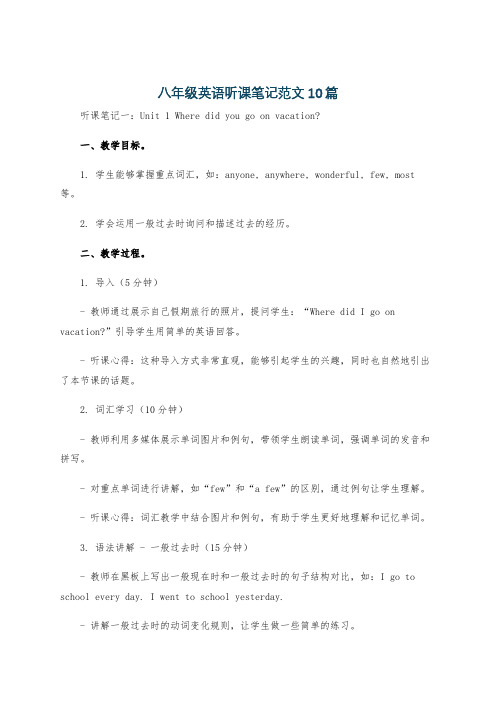
八年级英语听课笔记范文10篇听课笔记一:Unit 1 Where did you go on vacation?一、教学目标。
1. 学生能够掌握重点词汇,如:anyone, anywhere, wonderful, few, most 等。
2. 学会运用一般过去时询问和描述过去的经历。
二、教学过程。
1. 导入(5分钟)- 教师通过展示自己假期旅行的照片,提问学生:“Where did I go on vacation?”引导学生用简单的英语回答。
- 听课心得:这种导入方式非常直观,能够引起学生的兴趣,同时也自然地引出了本节课的话题。
2. 词汇学习(10分钟)- 教师利用多媒体展示单词图片和例句,带领学生朗读单词,强调单词的发音和拼写。
- 对重点单词进行讲解,如“few”和“a few”的区别,通过例句让学生理解。
- 听课心得:词汇教学中结合图片和例句,有助于学生更好地理解和记忆单词。
3. 语法讲解 - 一般过去时(15分钟)- 教师在黑板上写出一般现在时和一般过去时的句子结构对比,如:I go to school every day. I went to school yesterday.- 讲解一般过去时的动词变化规则,让学生做一些简单的练习。
- 听课心得:语法讲解清晰明了,对比的方式让学生更容易掌握两种时态的区别。
4. 对话练习(15分钟)- 教师给出对话模板,让学生两人一组进行对话练习,内容是关于假期去了哪里,做了什么。
- 巡视课堂,对学生的对话进行指导和纠正。
- 请几组学生上台展示对话。
- 听课心得:对话练习能够提高学生的口语表达能力,上台展示也增加了学生的自信心。
5. 课堂小结与作业布置(5分钟)- 教师总结本节课的重点内容,包括词汇和语法。
- 布置作业:写一篇关于自己假期经历的短文,运用一般过去时。
- 听课心得:课堂小结有助于学生巩固知识,作业布置合理,能够让学生进一步巩固所学内容。
八年级英语听课笔记范文10篇
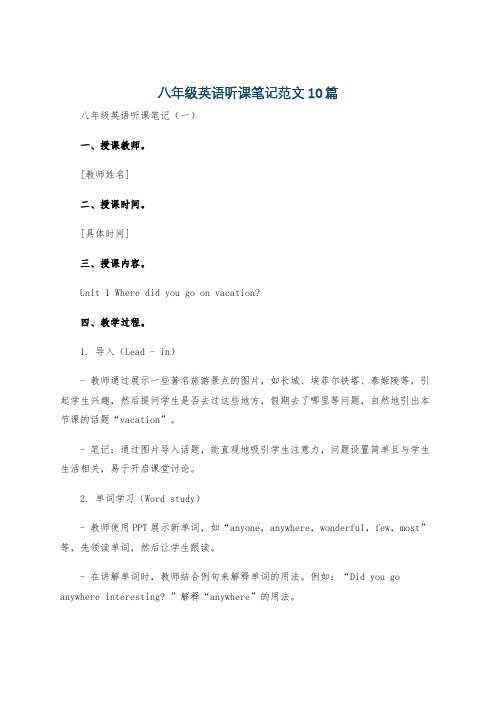
八年级英语听课笔记范文10篇八年级英语听课笔记(一)一、授课教师。
[教师姓名]二、授课时间。
[具体时间]三、授课内容。
Unit 1 Where did you go on vacation?四、教学过程。
1. 导入(Lead - in)- 教师通过展示一些著名旅游景点的图片,如长城、埃菲尔铁塔、泰姬陵等,引起学生兴趣,然后提问学生是否去过这些地方,假期去了哪里等问题,自然地引出本节课的话题“vacation”。
- 笔记:通过图片导入话题,能直观地吸引学生注意力,问题设置简单且与学生生活相关,易于开启课堂讨论。
2. 单词学习(Word study)- 教师使用PPT展示新单词,如“anyone,anywhere,wonderful,few,most”等,先领读单词,然后让学生跟读。
- 在讲解单词时,教师结合例句来解释单词的用法。
例如:“Did you go anywhere interesting? ”解释“anywhere”的用法。
- 笔记:单词教学采用先领读再讲解例句的方式,有助于学生掌握单词的读音和用法。
结合例句记忆单词效果更好。
3. 语法讲解(Grammar)- 重点讲解一般过去时的特殊疑问句。
教师在黑板上写出例句:“Where did you go on vacation?”“What did you do?”等。
- 分析句子结构,强调助动词“did”的用法,以及动词在一般过去时中的变化形式。
- 笔记:语法讲解清晰,在黑板上写例句方便学生观察句子结构,有助于理解一般过去时特殊疑问句的构成。
4. 听力练习(Listening practice)- 播放听力材料,听力内容是关于不同人假期的经历。
- 在播放听力之前,教师给出一些听力问题,如“Where did Tom go?”“What did he do there?”等,让学生带着问题听听力。
- 听力结束后,教师与学生一起核对答案,并对听力中的重点内容进行再次强调。
八年级英语听课记录模板范文外研版
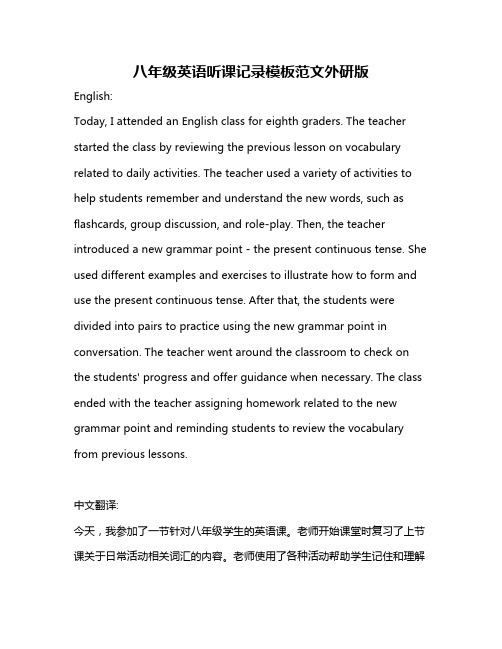
八年级英语听课记录模板范文外研版English:Today, I attended an English class for eighth graders. The teacher started the class by reviewing the previous lesson on vocabulary related to daily activities. The teacher used a variety of activities to help students remember and understand the new words, such as flashcards, group discussion, and role-play. Then, the teacher introduced a new grammar point - the present continuous tense. She used different examples and exercises to illustrate how to form and use the present continuous tense. After that, the students were divided into pairs to practice using the new grammar point in conversation. The teacher went around the classroom to check on the students' progress and offer guidance when necessary. The class ended with the teacher assigning homework related to the new grammar point and reminding students to review the vocabulary from previous lessons.中文翻译:今天,我参加了一节针对八年级学生的英语课。
八年级英语听课笔记范文10篇

八年级英语听课笔记范文10篇听课笔记一:Unit 1 Where did you go on vacation?一、教学目标。
1. 语言知识目标。
- 学生能够掌握重点单词,如:anyone, anywhere, wonderful, few等。
- 熟练运用重点句型“Where did you go on vacation? I went to...”进行对话交流。
2. 语言技能目标。
- 通过听力训练,提高学生获取信息的能力。
- 让学生能够用英语描述自己的假期经历。
二、教学过程。
1. 导入(Lead - in)- 教师展示一些著名旅游景点的图片,如长城、埃菲尔铁塔等,然后问学生是否去过这些地方,引出本节课话题“vacation”。
这个导入方式很直观,能迅速吸引学生的注意力,激发他们的学习兴趣。
2. 新单词学习(New words learning)- 教师使用多媒体展示单词图片和例句,领读单词。
在讲解“anyone”和“anywhere”时,特别强调了“any -”的用法,以及与“someone”和“somewhere”的区别。
这种对比教学有助于学生更好地理解和记忆。
3. 听力训练(Listening practice)- 播放听力材料之前,教师先让学生快速浏览听力题目,预测听力内容。
这是一个很好的听力技巧训练。
听力播放过程中,教师提醒学生注意关键词。
听完后,让学生回答问题并进行小组讨论核对答案。
4. 对话练习(Pair work)- 教师给出对话模板,让学生两人一组练习对话,询问对方的假期去处。
在学生练习过程中,教师巡视并给予指导,及时纠正学生的语法和发音错误。
5. 课堂总结(Summary)- 教师引导学生回顾本节课所学的单词和句型,强调重点和难点。
三、教学方法。
1. 直观教学法:通过图片展示新单词,让学生更易理解。
2. 任务驱动法:以听力任务、对话任务等驱动学生学习。
四、教学评价。
1. 教师对学生的表现给予及时的评价,以正面评价为主,如“Good job”“Well - done”等,增强了学生的自信心。
(完整版)八年级英语听课记录
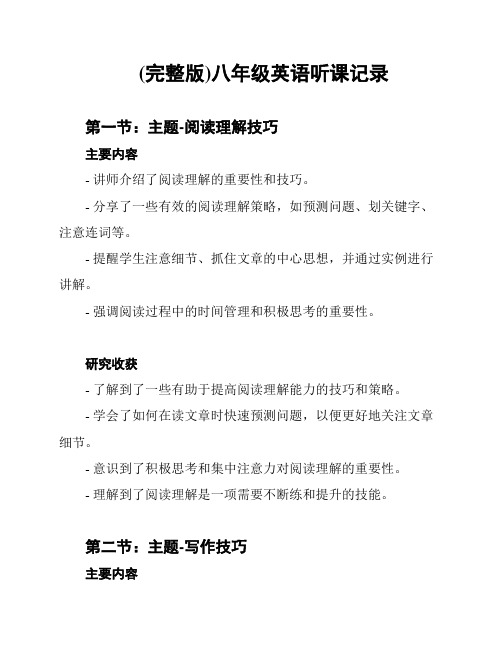
(完整版)八年级英语听课记录第一节:主题-阅读理解技巧主要内容- 讲师介绍了阅读理解的重要性和技巧。
- 分享了一些有效的阅读理解策略,如预测问题、划关键字、注意连词等。
- 提醒学生注意细节、抓住文章的中心思想,并通过实例进行讲解。
- 强调阅读过程中的时间管理和积极思考的重要性。
研究收获- 了解到了一些有助于提高阅读理解能力的技巧和策略。
- 学会了如何在读文章时快速预测问题,以便更好地关注文章细节。
- 意识到了积极思考和集中注意力对阅读理解的重要性。
- 理解到了阅读理解是一项需要不断练和提升的技能。
第二节:主题-写作技巧主要内容- 讲师介绍了写作的基本结构和技巧,如引言、主体段落和结论等。
- 分享了一些有效的写作策略,如提出观点、给出例证、使用合适的过渡词等。
- 强调写作过程中的逻辑思维和清晰表达的重要性,并通过实例进行讲解。
- 提醒学生注意写作时的时间管理和合理组织各段落。
研究收获- 了解到了一些有助于提高写作能力的技巧和策略。
- 学会了如何合理组织文章结构,使其逻辑清晰。
- 理解到了写作中的观点提出和例证给出的重要性。
- 意识到了时间管理和思维清晰表达对写作的重要性。
第三节:主题-口语表达技巧主要内容- 讲师介绍了有效的口语表达技巧,如流利地表达观点、使用恰当的表达方式等。
- 分享了一些提高口语能力的方法,如多听多说、模仿优秀的口语表达等。
- 强调口语表达中的自信和积极思维的重要性,并通过实例进行讲解。
- 提醒学生注意口语练的机会和时间安排。
研究收获- 了解到了一些有助于提高口语表达能力的技巧和策略。
- 学会了如何流利地表达自己的观点,避免口吃和语法错误。
- 意识到了自信和积极思维对口语表达的重要性。
- 理解到了口语表达需要不断练和提升的重要性。
总结这次听课让我收获良多。
通过研究阅读理解技巧、写作技巧和口语表达技巧,我提高了自己的英语能力。
我将会持续练和巩固所学的技巧,以便在英语研究中更加自如和有效地表达自己。
初二英语听课记录相关范文

初二英语听课记录相关范文推荐文章要怎么去自学英语热度:趣味英语学习方法精选合集热度:如何提升英语四级听力方法_英语四级听力练习方法热度:考研英语阅读一般做多长时间热度:如何走出考研翻译常见误区_考研翻译答题技巧热度:听课是一种对课堂进行仔细观察的活动,它对于了解和认识课堂有着极其重要的作用。
下面是店铺给大家整理的初二英语听课记录相关范文,供大家参阅!初二英语听课记录相关范文篇1要写好作文并不难,只有多多积累,多多练习,大家一定会成功的。
这篇二年级写国庆节的作文由精品学习网带给大家,欢迎大家阅读。
关于初中英语的听课笔记范文1.引语为一般陈述句,变为间接引语时一般由that引导(可省略)2.如果直接引语中的主语为第一人称,变为间接引语时人称要随主语作适当变化3.如果引述动词为一般过去时,间接引语中动词的时态一般推移到过去时间4.其他变化指示代词时间状语地点状语动词this—that today-that day here—there come--go these--those now-then重点词组: 1. keep out不让......进入 2. out of style不时髦的;过时的 3. call sb. up打电话给...... 4. pay for付款 5. ask for要求 6. the same as与......同样的 7. in style时髦的;流行的 8. get on相处;进展 9. as much as possible尽可能多 10. all kinds of各种;许多 11. on the one hand, ......(在)一方面,...... 12. on the other hand, ......另一方面,......初二英语听课记录相关范文篇2时间:2013年3月22日星期五授课教师:xxx班级:初二(14)班授课内容:外研社初二下 Module 6 Unit 1 She said China was very excitingplace.本节课虽然没有逐字逐句地详细记录黄老师的教学过程,但是,坐在教室,用欣赏的眼光看着眼前这位年轻而又充满活力的老师,心中还是有很多的感慨。
英语听课记录范文(实用6篇)
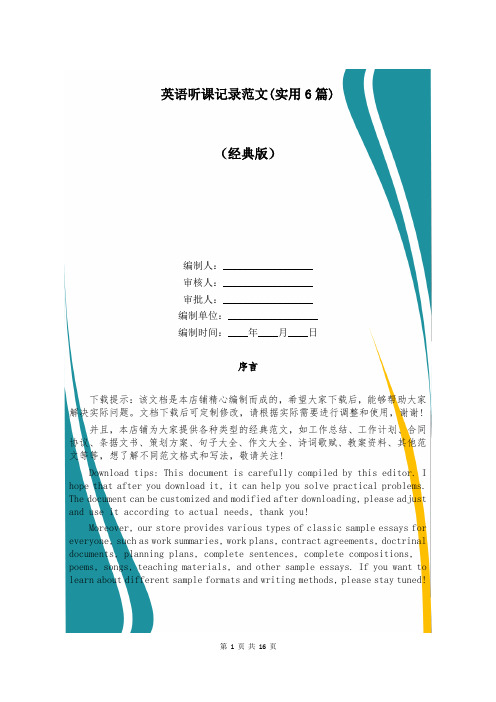
英语听课记录范文(实用6篇)(经典版)编制人:__________________审核人:__________________审批人:__________________编制单位:__________________编制时间:____年____月____日序言下载提示:该文档是本店铺精心编制而成的,希望大家下载后,能够帮助大家解决实际问题。
文档下载后可定制修改,请根据实际需要进行调整和使用,谢谢!并且,本店铺为大家提供各种类型的经典范文,如工作总结、工作计划、合同协议、条据文书、策划方案、句子大全、作文大全、诗词歌赋、教案资料、其他范文等等,想了解不同范文格式和写法,敬请关注!Download tips: This document is carefully compiled by this editor. I hope that after you download it, it can help you solve practical problems. The document can be customized and modified after downloading, please adjust and use it according to actual needs, thank you!Moreover, our store provides various types of classic sample essays for everyone, such as work summaries, work plans, contract agreements, doctrinal documents, planning plans, complete sentences, complete compositions, poems, songs, teaching materials, and other sample essays. If you want to learn about different sample formats and writing methods, please stay tuned!英语听课记录范文(实用6篇)英语听课记录范文第1篇五彩缤纷丰收11、秋天的雨香甜好闻(钥匙)传递信息欢乐听课评析这堂课的板书简明扼要地反映了课文的主要资料,脉络清楚,丰收和欢乐两个词语点明了课文的中心,深化了文章的主题。
初二英语听课记录30篇
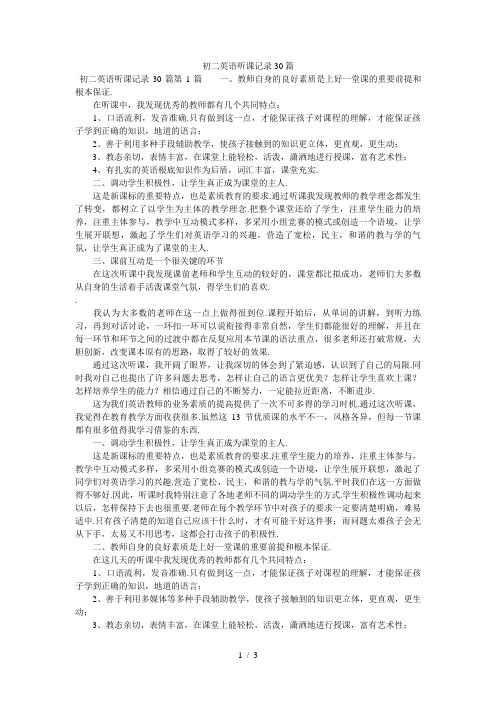
初二英语听课记录30篇初二英语听课记录30篇第1篇一、教师自身的良好素质是上好一堂课的重要前提和根本保证.在听课中,我发现优秀的教师都有几个共同特点:1、口语流利,发音准确.只有做到这一点,才能保证孩子对课程的理解,才能保证孩子学到正确的知识,地道的语言;2、善于利用多种手段辅助教学,使孩子接触到的知识更立体,更直观,更生动;3、教态亲切,表情丰富,在课堂上能轻松,活泼,潇洒地进行授课,富有艺术性;4、有扎实的英语根底知识作为后盾,词汇丰富,课堂充实.二、调动学生积极性,让学生真正成为课堂的主人.这是新课标的重要特点,也是素质教育的要求.通过听课我发现教师的教学理念都发生了转变,都树立了以学生为主体的教学理念.把整个课堂还给了学生,注重学生能力的培养,注重主体参与,教学中互动模式多样,多采用小组竞赛的模式或创造一个语境,让学生展开联想,激起了学生们对英语学习的兴趣,营造了宽松,民主,和谐的教与学的气氛,让学生真正成为了课堂的主人.三、课前互动是一个很关键的环节在这次听课中我发现课前老师和学生互动的较好的,课堂都比拟成功,老师们大多数从自身的生活着手活泼课堂气氛,得学生们的喜欢..我认为大多数的老师在这一点上做得很到位.课程开始后,从单词的讲解,到听力练习,再到对话讨论,一环扣一环可以说衔接得非常自然,学生们都能很好的理解,并且在每一环节和环节之间的过渡中都在反复应用本节课的语法重点,很多老师还打破常规,大胆创新,改变课本原有的思路,取得了较好的效果.通过这次听课,我开阔了眼界,让我深切的体会到了紧迫感,认识到了自己的局限.同时我对自己也提出了许多问题去思考,怎样让自己的语言更优美?怎样让学生喜欢上课?怎样培养学生的能力?相信通过自己的不断努力,一定能拉近距离,不断进步.这为我们英语教师的业务素质的提高提供了一次不可多得的学习时机.通过这次听课,我觉得在教育教学方面收获很多.虽然这13节优质课的水平不一,风格各异,但每一节课都有很多值得我学习借鉴的东西.一、调动学生积极性,让学生真正成为课堂的主人.这是新课标的重要特点,也是素质教育的要求.注重学生能力的培养,注重主体参与,教学中互动模式多样,多采用小组竞赛的模式或创造一个语境,让学生展开联想,激起了同学们对英语学习的兴趣.营造了宽松,民主,和谐的教与学的气氛.平时我们在这一方面做得不够好.因此,听课时我特别注意了各地老师不同的调动学生的方式.学生积极性调动起来以后,怎样保持下去也很重要.老师在每个教学环节中对孩子的要求一定要清楚明确,难易适中.只有孩子清楚的知道自己应该干什么时,才有可能干好这件事;而问题太难孩子会无从下手,太易又不用思考,这都会打击孩子的积极性.二、教师自身的良好素质是上好一堂课的重要前提和根本保证.在这几天的听课中我发现优秀的教师都有几个共同特点:1、口语流利,发音准确.只有做到这一点,才能保证孩子对课程的理解,才能保证孩子学到正确的知识,地道的语言;2、善于利用多媒体等多种手段辅助教学,使孩子接触到的知识更立体,更直观,更生动;3、教态亲切,表情丰富,在课堂上能轻松,活泼,潇洒地进行授课,富有艺术性;4、有扎实的英语根底知识作为后盾,词汇丰富,课堂充实.通过这次听课,我开阔了眼界,看到了自己的缺乏,以及自己与省优的差距.同时我对自己也提出了许多问题去思考,怎样让自己的语言更优美?怎样然孩子喜欢上课?怎样培养孩子的能力?相信通过自己的不断努力,一定能拉近距离,不断进步.初二英语听课记录30篇第2篇课前板书1.Do you like festival?2.What kinds of festivals do you know in China?3.Which festival do you like best? Why?4.What does your family usually do to get ready for Spring Festival? Teaching procedure Before classRead the words in Module 2 During class:1.Read the words and expressions in Module 22.Have a dictation of the words in Module 23.Ask and answer:Do you like festivals?What kinds of festivals do you know in China? Which festival do you like best? Why?What does your family usually do to get ready for Spring Festival?4.Group workDivide the students into nine groups and the topic for them to discuss is: What does your family do to get ready for Spring Festival?5.Talk about the pictures.6.Match the phrases and the pictures.7.Listen and read.8.Finish Part 3 --- Choose the correct answer.9.Homework评课意见:1、课前进教室,提前板书相关内容,为课堂教学顺利进行打下根底,并能有效的节省时间;2、教学环节设计安排清晰明了,过渡自然.3、能结合学校分组分享教学法和英语教学的学科特点,有效开展分组活动.如全班学生分成九个小组,共同讨论分享What does your family usually do to get ready for Spring Festival? 在这一环节中学生能够积极参与,并能充分运用所学语言知识进行英语表达;初二英语听课记录30篇第3篇上午,来到**中学参加初三英语教研活动.参加本次活动的市镇中心英语教研组的成员和全镇初三英语老师.本次活动首先听了六峰中学朱杰红老师的一杰初三教研课,然后,大家开展了积极的教研讨论活动,最后,曾衍明主任就初三英语复习工作做了一些工作部署. 下面是这节课的听课记录和听后随感.Teaching procedure1.课前朗读,复习单词2.Greetings ---- Whats the weather like today? Sunny.紧接着复习其他表示天气的单词..教师问:Whats the weather will be like if its rainy? 然后学生答复说:Itll be wet.感慨句的表达形式.How fine the day is! 当这一句话学生表述存在问题的时候,教师及时通过What a fineday it is ! 启发,并最终让学生顺利说出下面的句子:How fine it is! 接着,进一步问道:如何赞扬一个人呢?引出以下单词:clever, smart, careful, hard, hard-working, 然后说:He isa hard-working student.Ill learn from him.4.朗读Lesson 60 课文内容,之后,通过看幻灯片,谈论图片内容;(感觉在这一过程中,教师中文组织教学太多.如:首先,我们见到图画中有什么?像这样的句子完全可以直接用英语组织进行.教师通过幻灯片呈现故事,在故事的呈现中渗透语言知识,形式很好.如果能就图片提出一些目的性更强、有效性更高的问题就好了.)接着,教师继续由图片、话题引出.The dog is our best friend.We should take good care of it.这两句话可否连起来呢?让学生说出:The dog is our best friend and we should take good care of it.5.检查上次作文情况并步入正题----初三升中专题复习----书面表达在这一环节中,让学生做老师,阅读并修改作文,谈谈他们的好与不好到底何在,应当如何修改.6.朗读范文听课意见与随想总体感觉:朱老师在课堂教学中表现出了扎实的教学根本功和丰富的教学经验,并展示出了教师关爱学生、循循善诱等方面的教学特点.特别是在知识的引入过程中,十分注重启发学生思维,并在这一过程中努力提高学生的想象力和益友语言知识的运用能力.随想与建议:1.书面表达是语言学习过程中语言输出的.局部.它不是被动的语言输入,而是积极的主动输出.可以说,书面表达对于初三的同学来说,是最难的一个能力工程了.2.思考:如何提高学生作文或书面表达能力呢?我觉得:第一,应当给与学生足够正确的语言输入;第二,应当专设书面表达作文课.在作文课上教师亲自示范,并和学生一起作文.比方说在看图过程中,可以更好的启发学生如何看图、如何说图.(这样可以更好的深入到学生的思维内核.)当说图训练充分之后,在开展进行书面表达.第三,注意要点的把握.如时态准确、选字恰当、长短句问题、连接词问题等.第四,学生作文优秀的拿出示范,不佳的进行错误分析.在修改作文时需要考虑我们修改的标准是什么?显性和隐性的标准何在?同时,还可以结合考试标准中对书面表达的专门阐述,有所侧重地开展教学活动.3.从教学环节安排来看,个人觉得各环节小任务明确,但是,各个小任务与大任务的目标一致性方面还有待加强.4.关于口语语言输出的工作,有一个教学活动是否可以考虑:那就是课前给学生6-8个单词或短语,让他们用这些词语说出一段英语故事.然后,在每节课上课开始的前三分钟可以让学生展示.在一定程度上对学生语言的输入会有所帮助.5.从这节课中的作文材料来看,随想到一个问题:那就是路见不平、拔刀相助的问题.这不是一个英语知识问题.需要考虑的是:当我们路见不平的时候,要不要拔刀相助,如何相助? He knew what was happening.He threw the bottle hard and quickly to the man.-------We should help people in trouble.----But how? 也许,就这样的话题,可以用英语开展更加深入地讨论(语言输出).『初二英语听课记录30篇』由nozhao分享,本页面最后一次更新时间为2021-06-25,仅供参考,下载后可根据需要自行编辑修改.。
八年级英语听课记录模板范文
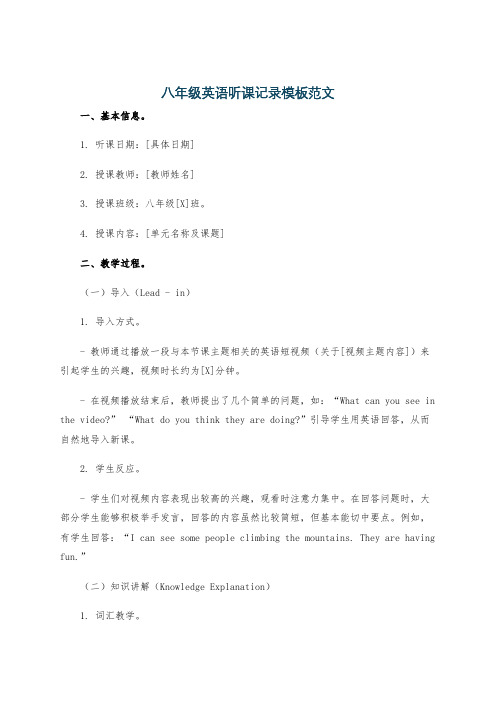
八年级英语听课记录模板范文一、基本信息。
1. 听课日期:[具体日期]2. 授课教师:[教师姓名]3. 授课班级:八年级[X]班。
4. 授课内容:[单元名称及课题]二、教学过程。
(一)导入(Lead - in)1. 导入方式。
- 教师通过播放一段与本节课主题相关的英语短视频(关于[视频主题内容])来引起学生的兴趣,视频时长约为[X]分钟。
- 在视频播放结束后,教师提出了几个简单的问题,如:“What can you see in the video?”“What do you think they are doing?”引导学生用英语回答,从而自然地导入新课。
2. 学生反应。
- 学生们对视频内容表现出较高的兴趣,观看时注意力集中。
在回答问题时,大部分学生能够积极举手发言,回答的内容虽然比较简短,但基本能切中要点。
例如,有学生回答:“I can see some people climbing the mountains. They are having fun.”(二)知识讲解(Knowledge Explanation)1. 词汇教学。
- 教师展示了本节课需要学习的新单词的图片(单词有[列举单词]等),并结合图片讲解单词的含义和发音。
例如,在讲解“[单词1]”时,教师指着图片说:“This is a [单词1],it is very [描述单词1的特征]. The pronunciation is [正确发音].”- 教师采用了多种方式让学生练习单词的发音,如让学生个别读、小组读、全班齐读等。
同时,还进行了简单的单词拼写练习,教师在黑板上写出单词的部分字母,让学生补全。
- 在词汇教学过程中,教师注意引导学生记忆单词的方法,如通过词根、词缀或者联想记忆法。
例如,对于“[有规律的单词]”,教师讲解了其词根和词缀的含义,帮助学生更好地理解和记忆。
2. 语法教学。
- 本节课的语法重点是[语法点名称]。
教师首先通过例句展示的方式引入语法点,如:“I [例句1],He/She [例句2].”然后详细解释了语法规则,包括语法结构、使用的语境等。
初中英语听课记录30篇
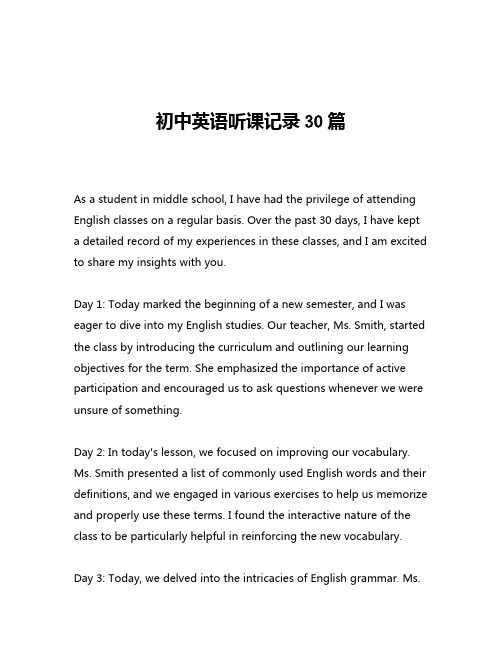
初中英语听课记录30篇As a student in middle school, I have had the privilege of attending English classes on a regular basis. Over the past 30 days, I have kept a detailed record of my experiences in these classes, and I am excited to share my insights with you.Day 1: Today marked the beginning of a new semester, and I was eager to dive into my English studies. Our teacher, Ms. Smith, started the class by introducing the curriculum and outlining our learning objectives for the term. She emphasized the importance of active participation and encouraged us to ask questions whenever we were unsure of something.Day 2: In today's lesson, we focused on improving our vocabulary. Ms. Smith presented a list of commonly used English words and their definitions, and we engaged in various exercises to help us memorize and properly use these terms. I found the interactive nature of the class to be particularly helpful in reinforcing the new vocabulary.Day 3: Today, we delved into the intricacies of English grammar. Ms.Smith explained the different parts of speech and their functions within a sentence. We then had the opportunity to apply our knowledge by identifying the various grammatical elements in sample sentences. I was surprised by how much I was able to learn in just one class period.Day 4: This class was dedicated to practicing our English writing skills. Ms. Smith provided us with a prompt and asked us to compose a short essay. I found this exercise to be both challenging and rewarding, as it allowed me to put my newly acquired vocabulary and grammar knowledge into practice.Day 5: In today's lesson, we explored the importance of pronunciation and intonation in the English language. Ms. Smith led us through a series of tongue twisters and dialogues, encouraging us to pay close attention to our articulation and the rhythm of our speech. I found this activity to be particularly helpful in improving my overall fluency.Day 6: Today, we focused on listening comprehension. Ms. Smith played a series of audio recordings, ranging from news reports to casual conversations, and asked us to answer comprehension questions. I found this exercise to be quite challenging, as it required me to actively listen and process the information being presented.Day 7: In this class, we explored the cultural aspects of the English-speaking world. Ms. Smith discussed the various customs, traditions, and social norms of different English-speaking countries. I found this to be a fascinating and enlightening lesson, as it helped me understand the cultural context behind the language.Day 8: Today, we delved into the world of English literature. Ms. Smith introduced us to a classic short story and led a discussion on the themes, characters, and literary devices used by the author. I was captivated by the depth and complexity of the story, and I found myself eager to explore more works of English literature.Day 9: In this lesson, we focused on improving our English conversation skills. Ms. Smith divided the class into pairs and asked us to engage in a series of role-playing exercises. I found this activity to be both challenging and rewarding, as it allowed me to practice my speaking skills in a real-world context.Day 10: Today, we explored the use of idioms and colloquial expressions in the English language. Ms. Smith presented a variety of common idioms and their meanings, and we discussed how these expressions are used in everyday speech. I found this lesson to be particularly enlightening, as it helped me understand the nuances of the English language.Day 11: In this class, we delved into the world of English poetry. Ms. Smith introduced us to a selection of classic poems and encouraged us to analyze the poetic devices used by the authors. I found this to be a thought-provoking and enriching experience, as it allowed me to appreciate the artistry and creativity inherent in the English language.Day 12: Today, we focused on improving our English reading comprehension skills. Ms. Smith provided us with a series of short passages and asked us to answer questions about the content. I found this exercise to be challenging but rewarding, as it helped me to better understand and interpret written English.Day 13: In this lesson, we explored the use of English in the professional world. Ms. Smith discussed the importance of effective communication in the workplace and provided us with tips and strategies for writing professional emails, resumes, and other business documents. I found this lesson to be particularly relevant and applicable to my future aspirations.Day 14: Today, we delved into the world of English grammar once again, this time focusing on more complex sentence structures and verb tenses. Ms. Smith presented a series of examples and encouraged us to practice using these grammatical concepts in our own writing and speaking. I found this lesson to be both challengingand enlightening, as it helped me to better understand the nuances of the English language.Day 15: In this class, we explored the use of English in the media and popular culture. Ms. Smith presented a series of examples, ranging from news articles to song lyrics, and encouraged us to analyze the language used in these contexts. I found this lesson to be particularly engaging and relevant, as it helped me to understand how the English language is used in the real world.Day 16: Today, we focused on improving our English pronunciation and accent. Ms. Smith led us through a series of exercises designed to help us improve our articulation and intonation. I found this lesson to be particularly helpful, as it allowed me to identify and address any areas of weakness in my spoken English.Day 17: In this lesson, we delved into the world of English literature once again, this time focusing on a more contemporary work. Ms. Smith introduced us to a modern novel and led a discussion on the themes, characters, and writing style of the author. I found this lesson to be both engaging and thought-provoking, as it allowed me to explore the evolution of the English language in a modern context.Day 18: Today, we explored the use of English in the field of science and technology. Ms. Smith presented a series of technical terms andencouraged us to discuss their meanings and applications. I found this lesson to be particularly interesting, as it helped me to understand the role of English in the global scientific community.Day 19: In this class, we focused on improving our English writing skills once again, this time with a focus on persuasive writing. Ms. Smith provided us with a prompt and asked us to compose a persuasive essay. I found this exercise to be both challenging and rewarding, as it allowed me to put my knowledge of vocabulary, grammar, and rhetorical devices into practice.Day 20: Today, we delved into the world of English idioms and slang once again. Ms. Smith presented a series of common expressions and encouraged us to discuss their meanings and origins. I found this lesson to be particularly enlightening, as it helped me to better understand the nuances of the English language and how it is used in everyday speech.Day 21: In this class, we explored the use of English in the field of arts and culture. Ms. Smith presented a series of examples, ranging from film reviews to art critiques, and encouraged us to analyze the language used in these contexts. I found this lesson to be particularly engaging and relevant, as it allowed me to understand the role of English in the global cultural landscape.Day 22: Today, we focused on improving our English listening comprehension skills once again, this time with a focus on more complex audio recordings. Ms. Smith played a series of interviews and news reports, and asked us to answer a series of comprehension questions. I found this exercise to be particularly challenging, but also rewarding, as it helped me to better understand the nuances of spoken English.Day 23: In this lesson, we delved into the world of English grammar once again, this time focusing on the use of modals and conditional structures. Ms. Smith presented a series of examples and encouraged us to practice using these grammatical concepts in our own writing and speaking. I found this lesson to be particularly enlightening, as it helped me to better understand the subtleties of the English language.Day 24: Today, we explored the use of English in the field of business and finance. Ms. Smith presented a series of business-related terms and encouraged us to discuss their meanings and applications. I found this lesson to be particularly relevant and applicable to my future aspirations, as it helped me to understand the role of English in the global business world.Day 25: In this class, we focused on improving our English speaking skills once again, this time with a focus on more formal andprofessional contexts. Ms. Smith divided the class into pairs and asked us to engage in a series of role-playing exercises, such as conducting a job interview or delivering a presentation. I found this activity to be both challenging and rewarding, as it allowed me to practice my speaking skills in a more structured and professional environment.Day 26: Today, we delved into the world of English literature once again, this time focusing on a work of non-fiction. Ms. Smith introduced us to a historical or biographical text and led a discussion on the use of language and the author's writing style. I found this lesson to be particularly enlightening, as it allowed me to appreciate the diversity and depth of the English language in a non-fictional context.Day 27: In this class, we explored the use of English in the field of law and politics. Ms. Smith presented a series of legal and political terms and encouraged us to discuss their meanings and applications. I found this lesson to be particularly relevant and thought-provoking, as it helped me to understand the role of English in the global political and legal landscape.Day 28: Today, we focused on improving our English writing skills once again, this time with a focus on creative writing. Ms. Smith provided us with a prompt and asked us to compose a short story orpoem. I found this exercise to be both challenging and rewarding, as it allowed me to tap into my creativity and express myself through the medium of the English language.Day 29: In this lesson, we delved into the world of English idioms and metaphors once again. Ms. Smith presented a series of common expressions and encouraged us to discuss their meanings and origins.I found this lesson to be particularly enlightening, as it helped me to better understand the nuances of the English language and how it is used to convey complex ideas and emotions.Day 30: Today, we wrapped up the semester with a comprehensive review of all the topics we had covered over the past 30 days. Ms. Smith led a discussion on the key takeaways and encouraged us to share our thoughts and reflections on our English language learning journey. I found this lesson to be particularly valuable, as it allowed me to synthesize all the knowledge and skills I had acquired over the course of the semester.Overall, my 30-day record of my middle school English class has been a truly enriching and enlightening experience. I have learned so much about the English language, its cultural and historical context, and its practical applications in the real world. I am grateful to Ms. Smith for her dedication and expertise, and I am excited to continue my English language learning journey in the years to come.。
人教版初中英语听课笔记范文10篇
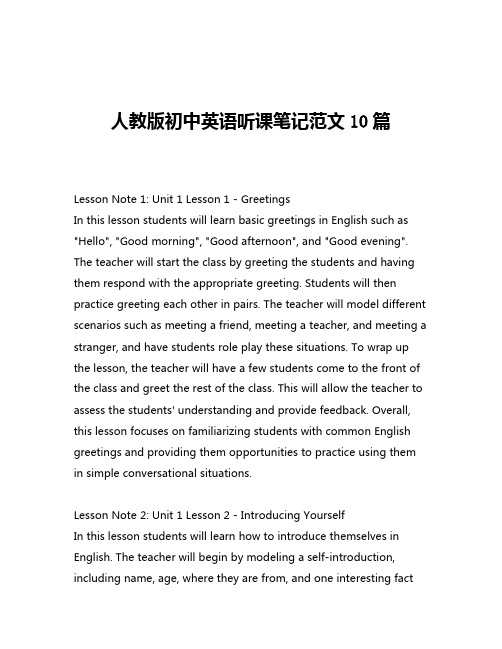
人教版初中英语听课笔记范文10篇Lesson Note 1: Unit 1 Lesson 1 - GreetingsIn this lesson students will learn basic greetings in English such as "Hello", "Good morning", "Good afternoon", and "Good evening". The teacher will start the class by greeting the students and having them respond with the appropriate greeting. Students will then practice greeting each other in pairs. The teacher will model different scenarios such as meeting a friend, meeting a teacher, and meeting a stranger, and have students role play these situations. To wrap up the lesson, the teacher will have a few students come to the front of the class and greet the rest of the class. This will allow the teacher to assess the students' understanding and provide feedback. Overall, this lesson focuses on familiarizing students with common English greetings and providing them opportunities to practice using them in simple conversational situations.Lesson Note 2: Unit 1 Lesson 2 - Introducing YourselfIn this lesson students will learn how to introduce themselves in English. The teacher will begin by modeling a self-introduction, including name, age, where they are from, and one interesting factabout themselves. Students will then practice introducing themselves to the class. The teacher will provide a sentence frame to guide the students "Hello my name is ___ I am ___ years old I am from ___ and I like ___." After the individual introductions, the teacher will have students introduce their classmates to the rest of the class. This will allow students to practice both introducing themselves and others. To wrap up, the teacher may have a small group activity where students have to interview each other and then introduce their partner to the class. This lesson focuses on giving students confidence in presenting personal information about themselves in English.Lesson Note 3: Unit 2 Lesson 1 - Talking about FamilyIn this lesson students will learn vocabulary related to family members and practice describing their own families. The teacher will begin by presenting flashcards with different family member vocabulary words and having students repeat after them. The teacher will then model describing their own family, including the names and ages of family members. Students will then work in pairs to interview each other about their families and prepare to introduce their partner's family to the class. As a wrap up activity, the teacher will call on random students to come to the front and introduce their partner's family to the class. This lesson aims to build students' confidence in using family-related vocabulary and describing their personal family situations in English.Lesson Note 4: Unit 2 Lesson 2 - Talking about PetsIn this lesson students will learn vocabulary related to common pets and practice describing the pets they have at home. The teacher will begin by showing images of different pets and having students name them in English. The teacher will then model describing their own pet, including the pet's name, type, color, and a few personality traits. Students will then work in small groups to discuss the pets they have at home and prepare to introduce one of their group member's pets to the class. As a wrap up, the teacher will call on random groups to come to the front and introduce one of their group member's pets to the class. This lesson focuses on expanding students' pet-related vocabulary and giving them opportunities to practice describing the pets in their lives.Lesson Note 5: Unit 3 Lesson 1 - Talking about Daily RoutinesIn this lesson students will learn vocabulary related to daily routines and practice describing their own daily schedules. The teacher will begin by presenting a list of common daily activities and having students repeat them. The teacher will then model describing their own daily routine using sequencing words like "first", "then", "after that", and "finally". Students will then work individually to write out their own daily schedules and prepare to present them to the class. As a wrap up, the teacher will call on random students to come to the front and describe their daily routines to the class. This lessonaims to build students' ability to talk about their daily lives and use sequencing language in English.Lesson Note 6: Unit 3 Lesson 2 - Telling TimeIn this lesson students will learn how to tell time in English. The teacher will begin by presenting analog and digital clock images and having students practice saying the time shown. The teacher will then model phrases for asking and telling the time, such as "What time is it?" and "It's 3:15." Students will then work in pairs to practice asking and telling the time. As a wrap up, the teacher may have a classroom clock that they use to call out different times and have students write down the time in their notebooks. This lesson focuses on giving students the language skills to communicate about the time in English.Lesson Note 7: Unit 4 Lesson 1 - Talking about HobbiesIn this lesson students will learn vocabulary related to common hobbies and practice describing their own interests. The teacher will begin by presenting images of different hobbies and having students name them in English. The teacher will then model describing their own hobbies, including why they enjoy those activities. Students will then work individually to write about their top 3 hobbies. As a wrap up, the teacher will call on random students to share one of their hobbies with the class. This lesson aims to build students' confidence in using hobby-related vocabulary and discussing their personalinterests in English.Lesson Note 8: Unit 4 Lesson 2 - Talking about Likes and DislikesIn this lesson students will learn how to express likes and dislikes in English. The teacher will begin by presenting a list of common likes and dislikes, such as "I like playing basketball" and "I don't like spicy food", and having students repeat after them. The teacher will then model having a conversation about likes and dislikes with a volunteer student. Students will then work in pairs to interview each other about their likes and dislikes. As a wrap up, the teacher may have students share one thing they like and one thing they dislike with the class. This lesson focuses on giving students the language skills to communicate their personal preferences in English.Lesson Note 9: Unit 5 Lesson 1 - Talking about the WeatherIn this lesson students will learn vocabulary related to weather and practice describing the current weather conditions. The teacher will begin by presenting images of different weather phenomena and having students name them in English. The teacher will then model describing the weather, using phrases like "It's sunny", "It's raining", and "It's cold outside." Students will then work in small groups to discuss the current weather and prepare to present a weather report to the class. As a wrap up, the teacher will call on random groups to come to the front and deliver a short weather report to the class. This lesson aims to build students' ability to discuss weather-relatedtopics in English.Lesson Note 10: Unit 5 Lesson 2 - Talking about SeasonsIn this lesson students will learn vocabulary related to the four seasons and practice describing the characteristics of each season. The teacher will begin by presenting images of the four seasons and having students name them in English. The teacher will then model describing the weather, activities, and clothing associated with each season. Students will then work individually to write a short paragraph describing their favorite season. As a wrap up, the teacher will call on random students to share their paragraphs with the class. This lesson focuses on expanding students' seasonal vocabulary and giving them opportunities to describe seasonal changes in English.。
初中英语听课笔记范文(共4篇)
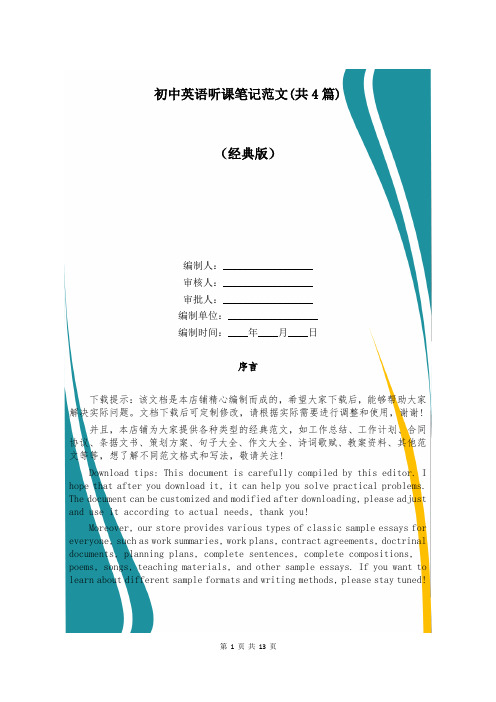
初中英语听课笔记范文(共4篇)(经典版)编制人:__________________审核人:__________________审批人:__________________编制单位:__________________编制时间:____年____月____日序言下载提示:该文档是本店铺精心编制而成的,希望大家下载后,能够帮助大家解决实际问题。
文档下载后可定制修改,请根据实际需要进行调整和使用,谢谢!并且,本店铺为大家提供各种类型的经典范文,如工作总结、工作计划、合同协议、条据文书、策划方案、句子大全、作文大全、诗词歌赋、教案资料、其他范文等等,想了解不同范文格式和写法,敬请关注!Download tips: This document is carefully compiled by this editor. I hope that after you download it, it can help you solve practical problems. The document can be customized and modified after downloading, please adjust and use it according to actual needs, thank you!Moreover, our store provides various types of classic sample essays for everyone, such as work summaries, work plans, contract agreements, doctrinal documents, planning plans, complete sentences, complete compositions, poems, songs, teaching materials, and other sample essays. If you want to learn about different sample formats and writing methods, please stay tuned!初中英语听课笔记范文(共4篇)初中英语听课笔记范文第1篇初中英语的听课笔记1.引语为一般陈述句,变为间接引语时一般由that引导(可省略)2.如果直接引语中的主语为第一人称,变为间接引语时人称要随主语作适当变化3.如果引述动词为一般过去时,间接引语中动词的时态一般推移到过去时间4.其他变化指示代词时间状语地点状语动词this―that today-that day here―there come――go these――those now-then 重点词组:out不让......进入of style不时髦的;过时的打电话给......for付款for要求same as与......同样的style时髦的;流行的on相处;进展much as possible尽可能多kind sof各种;许多the one hand,......(在)一方面......the other hand,......另一方面......初中英语听课笔记范文第2篇学校:20XX年11月16日第三节科目英语年班级6年级3班Unit5Whatdoesshedo?课题课堂教学过程授课教师一.复习全班学生一起读第四单元单词,一遍英语一遍汉语。
英语听课评课记录范文(必备15篇)
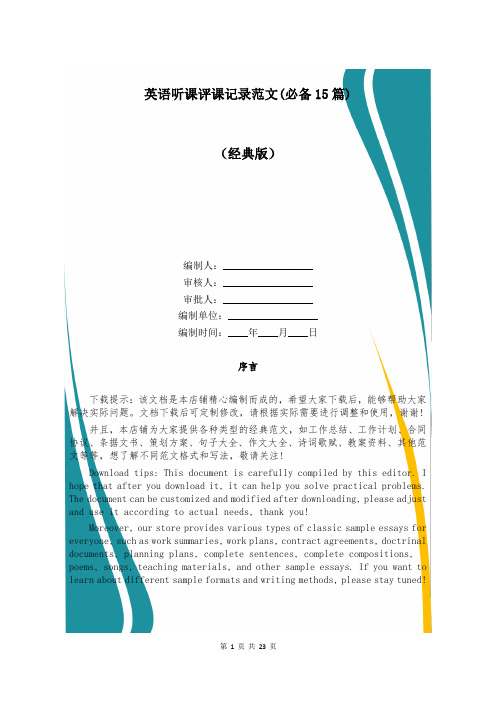
英语听课评课记录范文(必备15篇)(经典版)编制人:__________________审核人:__________________审批人:__________________编制单位:__________________编制时间:____年____月____日序言下载提示:该文档是本店铺精心编制而成的,希望大家下载后,能够帮助大家解决实际问题。
文档下载后可定制修改,请根据实际需要进行调整和使用,谢谢!并且,本店铺为大家提供各种类型的经典范文,如工作总结、工作计划、合同协议、条据文书、策划方案、句子大全、作文大全、诗词歌赋、教案资料、其他范文等等,想了解不同范文格式和写法,敬请关注!Download tips: This document is carefully compiled by this editor. I hope that after you download it, it can help you solve practical problems. The document can be customized and modified after downloading, please adjust and use it according to actual needs, thank you!Moreover, our store provides various types of classic sample essays for everyone, such as work summaries, work plans, contract agreements, doctrinal documents, planning plans, complete sentences, complete compositions, poems, songs, teaching materials, and other sample essays. If you want to learn about different sample formats and writing methods, please stay tuned!英语听课评课记录范文(必备15篇)英语听课评课记录范文第1篇随着学科领域整体改革的深入发展,英语课堂教学也发生可喜的变革。
八年级英语听课记录模板范文
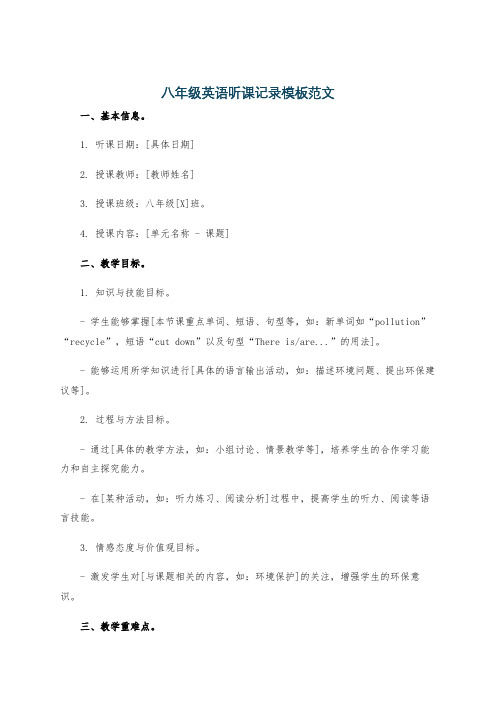
八年级英语听课记录模板范文一、基本信息。
1. 听课日期:[具体日期]2. 授课教师:[教师姓名]3. 授课班级:八年级[X]班。
4. 授课内容:[单元名称 - 课题]二、教学目标。
1. 知识与技能目标。
- 学生能够掌握[本节课重点单词、短语、句型等,如:新单词如“pollution”“recycle”,短语“cut down”以及句型“There is/are...”的用法]。
- 能够运用所学知识进行[具体的语言输出活动,如:描述环境问题、提出环保建议等]。
2. 过程与方法目标。
- 通过[具体的教学方法,如:小组讨论、情景教学等],培养学生的合作学习能力和自主探究能力。
- 在[某种活动,如:听力练习、阅读分析]过程中,提高学生的听力、阅读等语言技能。
3. 情感态度与价值观目标。
- 激发学生对[与课题相关的内容,如:环境保护]的关注,增强学生的环保意识。
三、教学重难点。
1. 教学重点。
- [重点知识内容,如:重点单词、短语和句型的理解与运用]。
- [特定的语言技能或任务,如:能够读懂关于环保措施的文章并获取关键信息]。
2. 教学难点。
- [较难理解或掌握的知识点,如:复杂句型结构的分析或特定语境下词汇的准确使用]。
- [涉及到学生思维转换或跨文化理解的内容,如:理解不同国家的环保理念差异]。
四、教学过程。
(一)导入(Lead - in)1. 导入方式。
- 教师通过展示[具体的导入素材,如:几张环境污染的图片或一段关于环境问题的短视频],引起学生的注意。
- 提问学生关于图片或视频内容的感受,如:“What can you see in these pictures? How do you feel about it?”2. 导入效果。
- 学生对导入内容表现出较高的兴趣,积极参与回答问题,顺利引出本节课的主题——[课题名称]。
(二)知识讲解(Presentation)1. 单词教学。
- 教师使用[具体的教学方法,如:PPT展示单词图片、单词发音示范]教授新单词。
初中英语教研听评课记录(3篇)

第1篇一、活动背景为了提高英语教学质量,促进教师专业成长,我校英语教研组于2021年10月26日开展了听评课活动。
本次听评课活动以“提升初中英语课堂教学效果”为主题,旨在通过听课、评课,发现问题,改进教学,提高英语教师的教学水平和学生的英语学习效果。
二、活动内容1. 听课本次听评课活动共安排了两位英语教师进行公开课展示,分别是八年级的《Unit 5 Do you want to watch a movie?》和九年级的《Unit 7 Will people have robots?》。
2. 评课听课结束后,教研组成员对两位教师的课堂教学进行了评课。
评课内容包括教学目标、教学内容、教学方法、教学过程、教学效果等方面。
三、听课记录1. 八年级英语《Unit 5 Do you want to watch a movie?》授课教师:张老师教学内容:本节课主要围绕电影话题展开,通过听、说、读、写等活动,帮助学生掌握电影相关词汇和句型,提高学生的英语交际能力。
教学过程:(1)导入:张老师通过展示电影海报,激发学生的学习兴趣,引出本节课的主题。
(2)新课呈现:通过听录音、看图片、讨论等方式,引导学生学习电影相关词汇和句型。
(3)巩固练习:设计多种形式的练习,如小组合作、角色扮演等,让学生在实际情境中运用所学知识。
(4)小结:总结本节课所学内容,强调重点知识。
教学效果:学生参与度高,课堂气氛活跃,教学目标达成较好。
2. 九年级英语《Unit 7 Will people have robots?》授课教师:李老师教学内容:本节课主要围绕机器人话题展开,通过讨论、辩论等活动,引导学生思考科技发展对人类生活的影响,提高学生的英语思维能力和表达能力。
教学过程:(1)导入:李老师通过展示机器人图片,引出本节课的主题。
(2)新课呈现:通过小组讨论、辩论等方式,引导学生思考机器人对人类生活的影响。
(3)巩固练习:设计情景对话、写作等练习,让学生运用所学知识表达自己的观点。
(完整word版)初二英语教学听课记录及评析

Task1: ask students to close the book and listen to the tape with a question. (2minutes)
Task2: ask students to listen to the tape again and answer the question. (2minutes)
Task3: ask stus in part4 (3minutes)
Step 7: Homework
Ask students to finish the rest of questions in part4 and part5 after class
除了时间上的不完美,这次课给人感觉时间过得很快,因为整节课有活动在支撑,自始至终的活动教学,梯度有序的学习过程,自始至终的形成性评价,有效的奖励,学生积极参与展示,培养创新思维能力的积极尝试,整合教材资源和自编资源,这也体现特级教师的教师魅力,让人不禁佩服赵老师。
初二英语教学听课记录及评析
讲课教师
XXX
班级
八年级11班
讲课时间
11月13日第4节
教授科目
英语
课题、章节
Module 9 unit 1
听课记录:
听课评议:
1,话题导入新课接近生活,引起学生兴趣,符合教学生活化要求。老师很好的调动学生积极性发言,练习学生口语。
2,板书与PPT结合,并且有扩展,例如:cartoon---cartoonist
Step4:Post-listening
Task 1:Discussion
Ask students to read text and role playing (3minutes)
初二英语听课记录例文.doc

初二英语听课记录范文初二英语听课记录范文篇1上午,来到**中学参加初三英语教研活动。
参加本次活动的市镇中心英语教研组的成员和全镇初三英语老师。
本次活动首先听了六峰中学朱杰红老师的一杰初三教研课,然后,大家开展了积极的教研讨论活动,最后,曾衍明主任就初三英语复习工作做了一些工作部署。
下面是这节课的听课记录和听后随感。
Teaching procedure1. 课前朗读,复习单词2. Greetings----What s theweather liketod ay? Sunny.紧接着复习其他表示天气的单词。
cloudy,rainy, sunny, windy,fine,etc. 然后,启发学生说出另外一些表示天气的单词:warm,cold,cool, hot,etc. 启发的方法是通过师生问答开展的。
教师问:What s the weather will belike ifitsrainy? 然后学生回答说:Itll bewet.3. 由It s a fine day. 复习感叹句的表达形式。
How fine the day is!当这一句话学生表述存在问题的时候,教师及时通过What a fineday it is ! 启发,并最终让学生顺利说出下面的句子: How fine it is!接着,进一步问道:如何赞扬一个人呢?引出下列单词:clever,smart, careful, hard,hard-working, 然后说: He is a hard-worki ng student. I ll learn from him.4.朗读Lesson 60 课文内容,之后,通过看幻灯片,谈论图片内容;(感觉在这一过程中,教师中文组织教学太多。
如:首先,我们见到图画中有什么?像这样的句子完全可以直接用英语组织进行。
教师通过幻灯片呈现故事,在故事的呈现中渗透语言知识,形式很好。
如果能就图片提出一些目的性更强、有效性更高的问题就好了。
初中英语八年级听课记录范文

初中英语八年级听课记录范文The classroom was filled with a sense of anticipation as the students eagerly awaited the start of the English lesson. The teacher, Mrs. Johnson, entered the room with a warm smile and immediately commanded the attention of the class. She began the lesson by reviewing the key vocabulary words from the previous class, ensuring that the students had a solid foundation to build upon.As the lesson progressed, Mrs. Johnson utilized a variety of teaching methods to engage the students. She started with a brief lecture, highlighting the main grammar concepts that would be covered that day. The students listened attentively, taking notes and occasionally raising their hands to ask clarifying questions. Mrs. Johnson's explanations were clear and concise, making the material accessible to all the students.Following the lecture, Mrs. Johnson divided the class into small groups and assigned them a collaborative activity. The students worked together to analyze a short passage, identifying the parts of speech and discussing the overall meaning of the text. The classroomwas filled with the sounds of lively discussion as the groups worked to complete the task. Mrs. Johnson circulated among the groups, offering guidance and support when needed.After the group activity, Mrs. Johnson transitioned to a series of individual practice exercises. The students were given worksheets with a range of grammar-focused questions, which they completed independently. Mrs. Johnson monitored the students' progress, providing feedback and assistance to those who needed it. The students worked diligently, demonstrating their understanding of the material.Towards the end of the lesson, Mrs. Johnson introduced a creative writing activity. She asked the students to compose a short story using the vocabulary and grammar concepts they had learned. The students enthusiastically began brainstorming ideas and drafting their stories. Mrs. Johnson encouraged them to be imaginative and to incorporate the new language skills into their writing.As the class period drew to a close, Mrs. Johnson reviewed the key takeaways from the lesson. She highlighted the importance of consistent practice and encouraged the students to continue exploring the English language outside of the classroom. The students left the classroom feeling engaged and motivated, eager to apply what they had learned in their future studies.Throughout the lesson, Mrs. Johnson demonstrated a deep understanding of her subject matter and a genuine passion for teaching. Her ability to adapt her teaching style to the needs of the students was particularly impressive. She seamlessly incorporated a range of instructional methods, catering to different learning preferences and ensuring that all the students were actively involved in the learning process.The students in this 8th grade English class displayed a high level of engagement and enthusiasm. They were attentive during the lecture, actively participated in the group and individual activities, and demonstrated a strong grasp of the material. The classroom environment was conducive to learning, with a positive and supportive atmosphere that encouraged the students to take risks and explore the English language.Overall, this 8th grade English class was a testament to the power of effective teaching. Mrs. Johnson's dedication, creativity, and adaptability allowed her to create a dynamic and engaging learning experience for her students. The students left the class feeling empowered and motivated to continue their English language journey, equipped with the skills and knowledge necessary to succeed in their future academic and personal endeavors.。
外研八上年级英语听课记录范文

外研八上年级英语听课记录范文
课程名称:英语听说课
授课人:李老师
授课时间:2023年3月16日,上午9:00-10:30
授课地点:外研八上年级教室
听课记录:
9:00,李老师准时进入教室,开始了今天的英语听说课。
这节课的主要内容是关于“假期计划”的听说训练。
9:05-9:20,李老师首先讲解了关于假期计划的背景知识,包括常用的旅行词汇、短语和句型。
学生们听讲认真,积极参与互动。
9:20-9:40,李老师播放了一段关于假期旅行的英语听力材料,学生们认真听取并回答相关问题。
随后,学生们分组进行角色扮演,模拟假期旅行的对话。
9:40-10:00,李老师邀请几位同学上台表演他们编制的假期旅行对话,并给予点评和指导。
同时,对同学们在表演中出现的发音、语调等问题进行了纠正。
10:00-10:20,李老师带领学生们进行口语练习,主题是“我的假期计划”。
学生们积极发言,用英语表达自己的想法和计划,李老师对每位同学的发言都给予
了肯定和鼓励。
10:20-10:30,李老师对本节课进行了总结,并布置了相关的听说练习作业。
总结:
本节课气氛活跃,学生们积极参与互动。
李老师的讲解清晰、生动,使学生们更好地理解并掌握课程内容。
同时,李老师注重对学生们的口语训练,有助于提高他们的英语听说能力。
在今后的教学中,建议多开展类似富有实用性和趣味性的听说活动,以激发学生的学习兴趣和积极性。
- 1、下载文档前请自行甄别文档内容的完整性,平台不提供额外的编辑、内容补充、找答案等附加服务。
- 2、"仅部分预览"的文档,不可在线预览部分如存在完整性等问题,可反馈申请退款(可完整预览的文档不适用该条件!)。
- 3、如文档侵犯您的权益,请联系客服反馈,我们会尽快为您处理(人工客服工作时间:9:00-18:30)。
初二英语听课记录范文
初二英语听课记录范文篇1
上午,来到**中学参加初三英语教研活动。
参加本次活动的市镇中心英语教研组的成员和全镇初三英语老师。
本次活动首先听了六峰中学朱杰红老师的一杰初三教研课,然后,大家开展了积极的教研讨论活动,最后,曾衍明主任就初三英语复习工作做了一些工作部署。
下面是这节课的听课记录和听后随感。
Teaching procedure
1. 课前朗读,复习单词
2. Greetings ---- What s the weather like today? Sunny.
紧接着复习其他表示天气的单词。
cloudy, rainy, sunny, windy, fine, etc. 然后,启发学生说出另外一些表示天气的单词:warm, cold, cool, hot, etc. 启发的方法是通过师生问答开展的。
教师问:What s the weather will be like if it s rainy? 然后学生回答说:It ll be wet.
3. 由It s a fine day. 复习感叹句的表达形式。
How fine the day is! 当这一句话学生表述存在问题的时候,教师及时通过What a fine day it is ! 启发,并最终让学生顺利说出下面的句子:How fine it is! 接着,进一步问道:如何赞扬一个人呢?引出下列单词:clever, smart, careful, hard, hard-working, 然后说:He is a hard-working student. I ll learn from him.
4. 朗读Lesson 60 课文内容,之后,通过看幻灯片,谈论图片内容;(感觉在这一过程中,教师中文组织教学太多。
如:首先,我们见到图画中有什么?像这样的句子完全可以直接用英语组织进行。
教师通过幻灯片呈现故事,在故事的呈现中渗透语言知识,形式很好。
如果能就图片提出一些目的性更强、有效性更
高的问题就好了。
)接着,教师继续由图片、话题引出。
The dog is our best friend. We should take good care of it. 这两句话可否连起来呢?让学生说出:The dog is our best friend and we should take good care of it.
5. 检查上次作文情况并步入正题----初三升中专题复习----书面表达
在这一环节中,让学生做老师,阅读并修改作文,谈谈他们的好与不好到底何在,应当如何修改。
6. 朗读范文听课意见与随想
总体感觉:朱老师在课堂教学中表现出了扎实的教学基本功和丰富的教学经验,并展示出了教师关爱学生、循循善诱等方面的教学特点。
特别是在知识的引入过程中,十分注重启发学生思维,并在这一过程中努力提高学生的想象力和益友语言知识的运用能力。
随想与建议:
1. 书面表达是语言学习过程中语言输出的部分。
它不是被动的语言输入,而是积极的主动输出。
可以说,书面表达对于初三的同学来说,是最难的一个能力项目了。
2. 思考:如何提高学生作文或书面表达能力呢?
我觉得:第一,应当给与学生足够正确的语言输入;第二,应当专设书面表达作文课。
在作文课上教师亲自示范,并和学生一起作文。
比如说在看图过程中,可以更好的启发学生如何看图、如何说图。
(这样可以更好的深入到学生的思维内核。
)当说图训练充分之后,在开展进行书面表达。
第三,注意要点的把握。
如时态准确、选字恰当、长短句问题、连接词问题等。
第四,学生作文优秀的拿出示范,不佳的进行错误分析。
在修改作文时需要考虑我们修改的标准是什么?显性和隐性的标准何在?同时,还可以结合考试标准中对书面表达的专门阐述,有所侧重地开展教学活动。
3. 从教学环节安排来看,个人觉得各环节小任务明确,但是,各个小任务与大任务的目标一致性方面还有待加强。
4. 关于口语语言输出的工作,有一个教学活动是否可以考虑:那就是课前给学生6-8个单词或短语,让他们用这些词语说出一段英语故事。
然后,在每节课上课开始的前三分钟可以让学生展示。
在一定程度上对学生语言的输入会有所帮助。
5. 从这节课中的作文材料来看,随想到一个问题:那就是路见不平、拔刀相助的问题。
这不是一个英语知识问题。
需要考虑的是:当我们路见不平的时候,要不要拔刀相助,如何相助? He knew what was happening. He threw the bottle hard and quickly to the man. -------We should help people in trouble.----But how? 也许,就这样的话题,可以用英语开展更加深入地讨论(语言输出)。
初二英语听课记录范文篇2
课前板书
1. Do you like festival?
2. What kinds of festivals do you know in China?
3. Which festival do you like best? Why?
4. What does your family usually do to get ready for Spring Festival? Teaching procedure Before class
Read the words in Module 2 During class:
1. Read the words and expressions in Module 2
2. Have a dictation of the words in Module 2
3. Ask and answer:
Do you like festivals?
What kinds of festivals do you know in China? Which festival do you like best? Why?
What does your family usually do to get ready for Spring Festival?
4. Group work
Divide the students into nine groups and the topic for them to discuss is: What does your family do to get ready for Spring Festival?
5. Talk about the pictures.
6. Match the phrases and the pictures.
7. Listen and read.
8. Finish Part 3 --- Choose the correct answer.
9.Homework
评课意见:。
